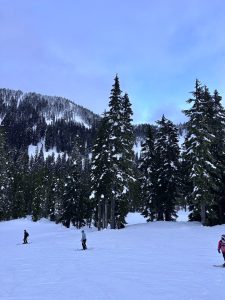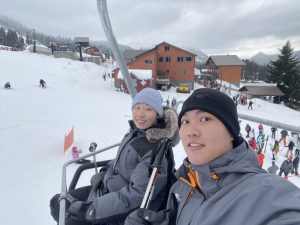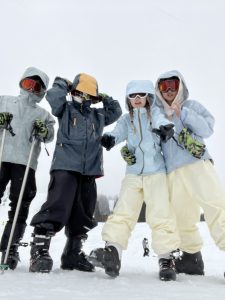Enriching College Lives Through Skiing
What are the Benefits of Skiing, Why is it a Preferable Sport, and Safety Tips for Skiing
Xiaoke Huang, Lele Zhang, EDUC 200 Student, Mandy Zhang
In the past few years, skiing has transformed from a recreational activity to a vital aspect of student life at the University of Washington. What started as a weekend hobby has grown into an essential component of physical, social, and emotional well-being for many UW students. For us, skiing provides a unique blend of physical challenge, emotional release, and social bonding. Through this article, we would like to explore how skiing enriches college life by offering physical benefits, creating strong social connections, and promoting safety in an exhilarating environment.
“When I first joined the UW ski club, I was amazed at how skiing could bring people together,” said one of UW student. “Not only did I improve my fitness, but I also made lifelong friends and learned essential life skills.”
Research supports these experiences. According to TIME, skiing is an excellent full-body workout that engages multiple muscle groups, improves cardiovascular health, and boosts overall fitness (Heid, 2018). The physical demands of skiing involve core strength, balance, and endurance, which collectively contribute to a healthier lifestyle. Regular participation in skiing can lead to improved physical conditioning and a greater sense of physical competence, which is particularly beneficial for students balancing rigorous academic schedules.
But the benefits of skiing extend far beyond the physical. Emotionally, skiing offers a sense of freedom and exhilaration that is hard to find in other sports. “Each time I ski down the slope, the sensation of speed and freedom is unparalleled by other sports. Skiing makes me feel a special kind of freedom and challenge,” says another UW student, highlighting the emotional highs that come with the sport. The adrenaline rush experienced during skiing can be a powerful stress reliever, helping students to manage the pressures of academic life more effectively. This emotional release is crucial for maintaining mental health and well-being.

Skiing also plays a crucial role in fostering social connections and building a sense of community. At UW, skiing is more than just a sport; it is a “thick institution” that creates shared experiences and strengthens bonds among participants (Brooks, 2017). The concept of a “thick institution” defined by Brooks refers to activities deeply embedded in the social fabric of the community, creating lasting bonds and a strong sense of identity. “Skiing not only fosters a sense of belonging among participants, but it also strengthens relationships between communities through shared experiences and traditions,” says another interviewee. These shared experiences are evident in both formal ski clubs and informal group outings, where students gather to enjoy the slopes together.

“I joined one of the ski clubs, and right now most of my friends are ski friends. We are not only skiing together; during the summer time, we will hike together,” said another student. The ski club at UW provides a structured environment for students to learn and grow together, while informal outings allow for spontaneous bonding and camaraderie.
The natural beauty of Snoqualmie Pass and Crystal Mountain, both just a short drive from Seattle, provides the perfect backdrop for these skiing adventures. These locations offer students a much-needed escape from academic pressures, promoting mental well-being and creating unforgettable memories. The National Research Council notes that natural settings enhance satisfaction and well-being, making these ski trips an integral part of the college experience (National Research Council, 2002). The serene and picturesque landscapes of these ski locations offer a stark contrast to the urban environment of the campus, providing a refreshing change of scenery that rejuvenates the mind and body.

“It’s amazing how a shared passion for the slopes can bring people together,” remarked another skier, underscoring the role of skiing in creating strong social bonds. The vibrant community at the UW skiing club is a testament to the sport’s ability to bring people together. The ski club acts as a “thick institution” by embedding itself into the social and cultural fabric of the university, creating rituals and traditions that enhance the student experience. Whether it’s through formal club activities or informal gatherings, skiing at UW helps students forge strong connections, build leadership skills, and develop a sense of belonging.
As we reflect on our skiing experiences, it’s clear that this sport has profoundly enriched our lives. From the physical benefits and emotional highs to the strong social bonds and safety practices, skiing has become an indispensable part of our college journey. Through skiing, we’ve not only improved our health and well-being but also built a supportive community that will last long after graduation. The friendships forged on the slopes are characterized by shared challenges and triumphs, creating a network of support that extends beyond the university.
Skiing at UW exemplifies how extracurricular activities can enhance the overall college experience. It provides students with an opportunity to break away from their academic routines, engage in physical activity, and build meaningful relationships. The holistic benefits of skiing, encompassing physical fitness, emotional well-being, and social connections, make it a cornerstone of student life at UW. As the skiing community continues to grow, it stands as a testament to the power of shared experiences in shaping a fulfilling and well-rounded college experience.
References
- Brooks, D. (2017, April 18). How to leave a mark on people. The New York Times. https://www.nytimes.com/2017/04/18/opinion/how-to-leave-a-mark-on-people.html
- Brennan, E. (2014, December 9). How to make skiing fun for beginners. The New York Times. https://www.nytimes.com/2014/12/14/travel/how-to-make-skiing-fun-for-beginners.html
- Carv – Digital Ski Coach. (2022, October 20). How to improve your skiing with 3 simple tips [Video]. YouTube. https://www.youtube.com/watch?v=1Zcy_nsOwGk
- Heid, M. (2018, January 25). Why skiing is a ridiculously good workout. TIME. https://time.com/5118770/is-skiing-a-good-workout/
- National Research Council. (2002). Chapter 2: The importance of place and connectedness. In Community and quality of life: Data needs for informed decision making (pp. 55-76). The National Academies Press. https://canvas.uw.edu/courses/1723085/files/117317394?module_item_id=20505216
- The Bag o’ Tricks. (2018, September 26). Why You Should Start Skiing [Video]. YouTube. https://www.youtube.com/watch?v=tROkDOjHu78
ChatGPT disclaimer
Our group used ChatGPT for background research, polishing, and grammar check. We used it as a guiding tool, but the final narrative and reflections are our own.
Media Attributions
- First person point of view from Snoqualmie © Lele Zhang is licensed under a CC BY-NC (Attribution NonCommercial) license
- 3fccbb18066ae6b47f419f01ca60409
- © Mandy Zhang is licensed under a CC BY-NC (Attribution NonCommercial) license

